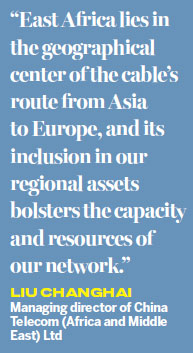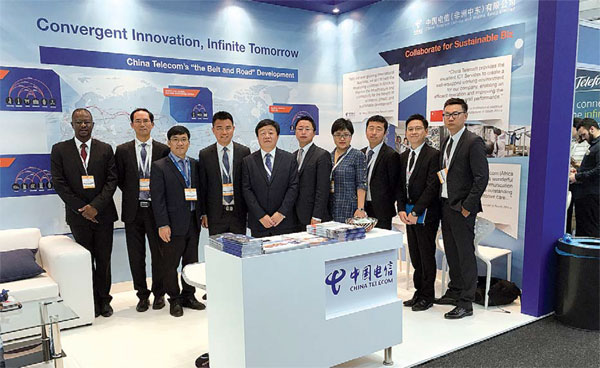Ocean-floor cable beefs up Africa connection

High-speed fiber-optic umbilical provides a superhighway for digital content
With a bustling economy, rapid regional integration and improving infrastructure, the demand for efficient information networks in Africa is on the rise to better meet the demands of global businesses and entice future investors. So expanding Africa's telecommunications capabilities - both in speed and capacity - is a priority.
Major telecommunications companies, such as China Telecom, have risen to the challenge.
"One of China Telecom's latest commitments to Africa is the construction of the Southeast Asia-Middle East-Western Europe (SEA-ME-WE 5) fiber-optic submarine cable, which started in 2014 and was completed in December," says Liu Changhai, managing director of China Telecom (Africa and Middle East) Limited.
| CTMEA showcased its capabilities at the annual AfricaCom event in late 2016 to highlight the company's new products and services in Africa and Middle East. Provided to China Daly |
"China Telecom Global is one of the founding members of the cable consortium, which comprises 18 other global telecommunications companies from Southeast Asia, China, India, the Middle East and Europe.
"The cable uses the latest technology to achieve speeds of up to 100 gigabytes per second and has an initial system capacity of 24 terabits, providing 16 countries in Asia, Africa, the Middle East and Western Europe with a consistent, low-latency connection."
This cross-regional superhighway is expected to supply global and domestic networks with agile and unencumbered access to digital content and popular e-commerce sites in the African and Middle Eastern region, Liu says.
To create a fiber access point, China Telecom (Africa and Middle East), or CTMEA, is coordinating with the Djibouti Data Centre (DDC), a Tier- 3 data center that serves as a major connection hub for many submarine cable systems, including the latest one, Liu says. "This enables the entire African continent to be interconnected with the SEA-ME-WE 5 cable, strengthening China Telecom's networks in Africa."
The laying of the cable and cooperation with DDC "marks a significant milestone in our regional efforts to open up the continent to larger global opportunities, such as China's Belt and Road Initiative", Liu says.
"East Africa lies in the geographical center of the cable's route from Asia to Europe, and its inclusion in our regional assets bolsters the capacity and resources of our network, in turn allowing us to provide the best level of service to our global enterprise customers and carrier partners in Djibouti, Ethiopia and other countries in East Africa."

CTMEA leverages an ever-expanding global network to develop sustainable communications networks and infrastructure around the world. Its regional heaquarters is in Mauritius and supported by offices in Dubai, Johannesburg and Nairobi. The company serves the rest of Africa through network nodes in North Africa (Cairo, Djibouti), East Africa (Nairobi, Dar Es Salaam), South Africa (Johannesburg), West Africa (Lagos) and the Middle East (Dubai, Fujairah), allowing CTMEA to channel resources and expertise across Africa and the Middle East region and providing digital access in a scalable manner.
The new submarine cable is one of the many assets in China Telecom's portfolio that the company taps to bring new global opportunities to Africa.
Africa has undergone a digital revolution in the past decade and is rapidly advancing toward the standards of the world's developed nations. Its booming technology industry is witnessing tech-based startups and ICT companies rapidly establishing a presence in the region, resulting in a need for high-speed data and reliable information networks.
With its global footprint, CTMEA is poised to support Africa's digital growth by collaborating with regional partners and stakeholders to identify on-the-ground challenges and propose comprehensive solutions.
In partnership with regional telecommunications operators, CTMEA is dedicated to providing comprehensive network IP and high bandwidth, as well as ICT management and integration solutions.
CTMEA also works closely with public and private developers to incorporate smart city technologies into urban infrastructure, in an effort to further boost efficiency and reduce the cost and consumption of resources.
The breadth of the African continent has presented a host of unique challenges that vary from country to country. Variables include project requirements, material and labor costs, infrastructure development and geopolitical stability - meaning there isn't a one-size-fits-all solution when implementing information networks.
"In order to build the region's economic potential and business capabilities, CTMEA strives to create an environment that fosters mutually beneficial partnerships with clients, local telecommunications providers or other partners by emphasizing a flexible approach toward policy and fee charges in order to better support or tailor solutions to their specific needs," Liu says.
CTMEA prioritizes partnerships that are sustainable and will contribute to the region's development in the future. Multinational corporations and businesses can benefit from a comprehensive ICT suite of solutions from CTMEA, provided through a resilient global network, allowing businesses to leverage expertise and resources from their presence across the globe and focus them on developing local core competencies, Liu says.
Through long-term strategic partnerships, CTMEA aims to help clients and partners grow their businesses by reducing operational costs and improving network quality for communities and businesses all over Africa, Liu adds.
As Africa continues to grow its global presence, co-development between its countries will become a priority, Liu says. The company collaborates with local telecom service providers to channel its large pool of network resources and talents, drawn from established regional bases in both Africa and the Middle East, to improve local networks and, subsequently, customer satisfaction. CTMEA also benefits from its extensive network in China, as well as funding from financial institutions that are recognized by the Chinese government.
"With the launch of the SEA-ME-WE 5 submarine cable, CTMEA now aims to further expand its business operations in order to serve its customers better," Liu says. "This translates to the further development of network infrastructure for new markets."
CTMEA also aims to increase the level of expertise within the region's workforce by increasing its hiring of local employees. This is to ensure that the company and its partners will be able to continue supporting the development of ICT within the community in the near future.
The potential for breakthrough technologies and innovation to emerge from Africa and surrounding regions is immense, and CTMEA aims to be the catalyst to kick start this process, Liu says, adding that through its investments in building network infrastructure and expertise, CTMEA, along with its partners and clients, is paving the way toward a more connected, united and collaborative Africa.
For China Daily
(China Daily Africa Weekly 03/03/2017 page27)
Today's Top News
- Crossing a milestone in the journey called Sinology
- Chinese, Russian media outlets urged to enhance cooperation
- Where mobility will drive China and the West
- HK community strongly supports Lai's conviction
- Japan paying high price for PM's rhetoric
- Japan's move to mislead public firmly opposed































